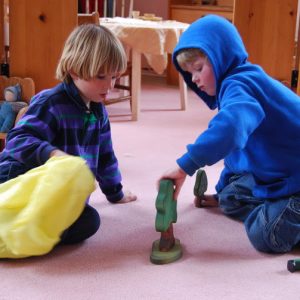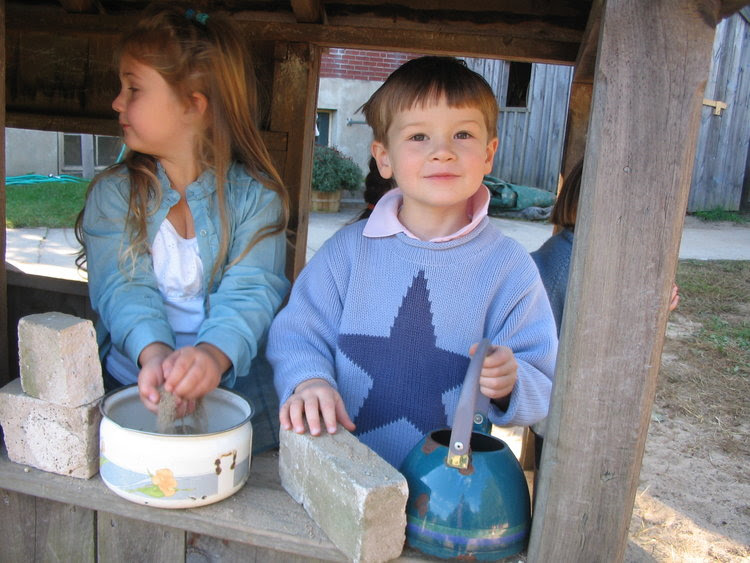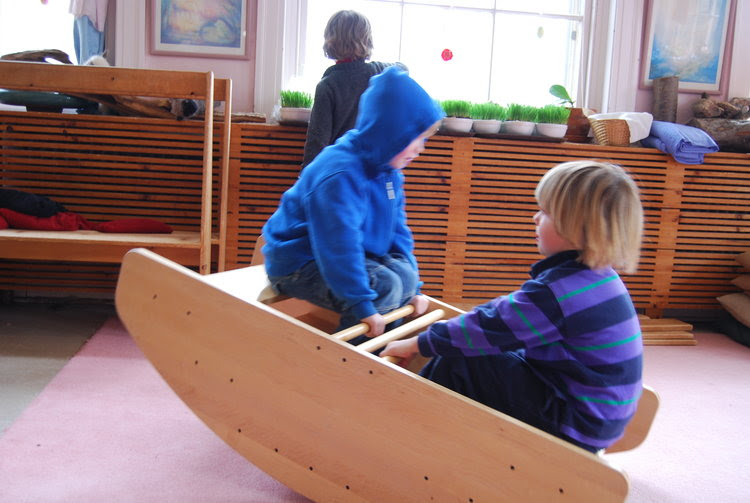
Reflections of a Waldorf Nursery Teacher
by Kam Anderson, Beach Rose Nursery Teacher
I continue to be amazed by young children, their wonder and joy for life is infectious. However, they are still just landing and growing so rapidly. Four years of life go quickly for us as adults and yet for many of our children they were just a parent’s dream.
I have been thinking about this quality of play and imagination that live so deeply in young children. It is a precious gift and one that is not offered at any other time in a human being’s life. How do we as a culture and as parents and caregivers honor and support this time of childhood?
What’s the rush?
When children are in the womb the process of growth is nurtured and certainly not hurried. Mothers are encouraged to eat well, exercise and rest. Taking care of the mother is vital to a developing baby. We certainly don’t rush this process and in fact have the mother rest when it seems that the baby might arrive too early.
However when the baby is born our culture seems to promote a different focus. Now the baby is encouraged to move along with a quicker pace. If a child can be upright and moving more quickly then perhaps this child will be brighter, better prepared for life in a way. There is a sense of impatience and even anxiety if a child is unfolding too slowly.
As parents and caregivers it can seem that our role when the children are young is to encourage and stimulate. I thought about how a child has grown for hundreds of years even thousands of years in a consistent way. A young child completes three vital tasks between birth and three which makes them truly human; they learn to walk, they learn to talk and they gain the capacity to have their own ideas or thoughts (I do it! Sound familiar?). If they are raised in an environment where they can imitate these capacities of walking and talking and being engaged with life then they do in deed complete the tasks without any real “help” or stimulation unless, of course, they have developmental issues.
Through play children learn what it means to be human
Children who are three going on four have recently completed these basic developmental tasks and now their imagination is waking up. Why is this imagination and free play so important? It seems at times in our culture frivolous, useless even. Play in our culture is often seen as something to be done if there is time. Our modern early childhood programs now have pre-K children preparing for Kindergarten by learning numbers, letters and if they can read then even better. So why are we having our children play for large chunks of the day?
I have been observing children in play for many years and my reflections are that through play children are learning and experiencing in a deep and profound way what is means to be human. Young animals play to learn about how to hunt, to be still, to be agile etc… skills for their life as adult animals. Children are learning to be human by playing as well. They experience their environment and then like eating a bit of bread they chew up their experience until it is in tiny bits and so digest it and then release it through their activity of play.Young children engage with the world through their bodies, and their senses. Anything that surrounds a young child is fodder for play.

Imaginative play
Imaginative play is vital for children since it allows them to gain experience and to make sense of the world. Here they learn what it means to be human. They watch the street cleaners, the fire fighters, the fishermen, the carpenters etc… and it then informs their play. Our culture is now providing fewer real images for children to imitate as our ways to work become less connected to the earth and daily needs. The baker, the miller, the cobbler etc… are becoming past images. Anytime we engage in work the children can see helps them engage and experience life. In my class we water plants because they need our care, we bake , we chop carrots, we shovel snow and pull weeds.
I so enjoy watching the children in my class catch clams, fish, build houses, care for babies, tend to domestic animals that need our care, and make pancakes. These are all activities of real daily life. When play revolves around these community activities often the play hums along and transforms from one event to another. There is an understanding of being able to sink into these human activities.
How media influences play
As I continue to ponder play I notice when play can get too exciting and chaotic. This happens often when their play is difficult to really imitate. Often this can involve media images like batman or another superhero. They put on their capes and they are off running but to what? They are fighting bad guys but who are the bad guys?
Children this young just don’t have the capacity to see life in a dual way. They are sorry when they hit a friend in an impulsive moment and we as caregivers help them with this process. They are still growing into their awareness as separate beings from others. These media images are often so intense that they can overstimulate and so make a child get stuck in their play so they have to replay the experience or image again and again and again as a way to make sense of it, to digest it and make it their own experience.
Preserving the magic
When we as caring and excited teachers and parents bring our adult knowledge to a young child it too can do the same thing as media. It can jam up their play. Perhaps we are interested in cars, or sports or wild animals and so we bring our knowledge through instruction and so the little ones have so many images for example about how cars run, how they are made, the models of cars and so they can get stuck. When another child says “ lets get in the car and drive to Grandmas” the child immersed in cars can say “ wait no you can’t drive that car” or “no it needs a certain kind of gas” etc… The child is losing the magical ability to be in the moment of free play and instead gets stuck in the content that the young child is just not ready developmentally to use. Then this child can lose their dreaminess which is important to imaginative free play.
The gift of time
Finally my last reflection is the gift we can give at this age of time. There is truly plenty of time although our culture begs to differ. A child at this age is using a huge amount of energy to grow, we call it etheric forces. If a child is tired, hungry, overstimulated etc… these forces get used up more quickly and it can be difficult for children to be able to play. Their sense of life gets affected, they just feel off.
The most important gift we give to children now is time to grow and be physically solid and healthy. Time to use their bodies and be active through play and healthy movement like walks, climbing, etc… We as parents and teachers need to trust that they have all they need and we can protect and nurture this time of wonder and openness by creating solid rhythms, rituals and tending to their bodily and emotional care.
These are just my reflections as a teacher for many years. I feel honored to continue to watch little ones unfold each in their own special way. They are all wonderful beings and teach all of us adults the riches of life.

From The Waldorf School of Cape Cod, republished in Waldorf Today.
